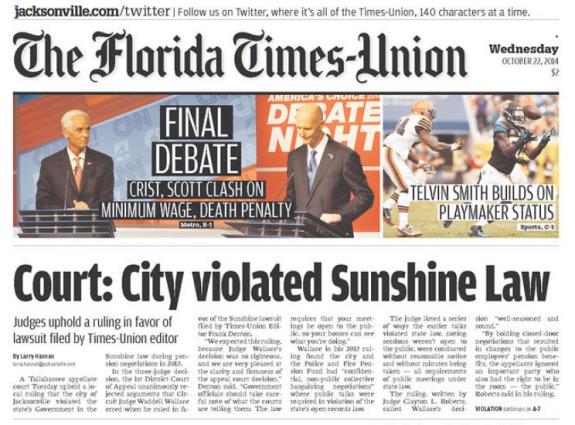By Ashley Lopez
Florida Center for Investigative Reporting
The Florida Times-Union in Jacksonville recently won a legal battle over Sunshine laws. According to the paper, city officials improperly held private meetings regarding pensions.
A circuit court had originally ruled in favor of the Times-Union, but city officials challenged the decision.
This week, an appeals court stood by the original ruling.
In the three-judge decision, the 1st District Court of Appeal unanimously rejected arguments that Circuit Judge Waddell Wallace erred when he ruled in favor of the Sunshine lawsuit filed by Times-Union Editor Frank Denton.
“We expected this ruling, because Judge Wallace’s decision was so righteous, and we are very pleased at the clarity and firmness of the appeal court decision,” Denton said. “Government officials should take careful note of what the courts are telling them: The law requires that your meetings be open to the public, so your bosses can see what you’re doing.”
Wallace in his 2013 ruling found the city and the Police and Fire Pension Fund had “confidential, non-public collective bargaining negotiations” where public talks were required in violation of the state’s open records law.
The judge listed a series of ways the earlier talks violated state law, noting sessions weren’t open to the public, were conducted without reasonable notice and without minutes being taken — all requirements of public meetings under state law.
The ruling, written by Judge Clayton L. Roberts, called Wallace’s decision “well-reasoned and sound.”
“By holding closed-door negotiations that resulted in changes to the public employees’ pension benefits, the appellants ignored an important party who also had the right to be in the room — the public,” Roberts said in his ruling.
The appeals court also ruled that the city would have to pay the newspaper’s attorney fees for the legal challenge to the original ruling. That is in addition to the order requiring the city to pay for the Times-Union’s legal costs from the trial portion of the lawsuit.
According to the Times-Union, the paper’s attorney George Gabel said “the benefit of this lawsuit is that it made clear that all future negotiations must be conducted in public.”

